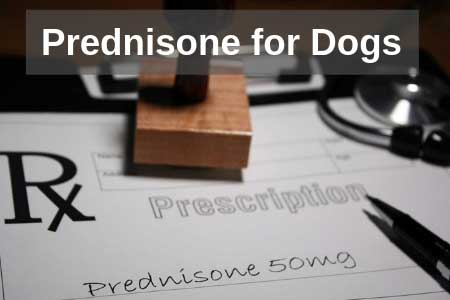You’re bound to be concerned when your favorite family member falls sick. In fact, most pet owners go into panic mode wondering what could be wrong with their beloved pooch. A quick visit to the vet may make you feel better and worse at the same time.
While you’re happy that your dog can be healthy again with a few doses of medicine, you might still be concerned about the horrendous side effects of the drug. Prednisone is a synthetic steroid that your vet may prescribe to treat a wide variety of diseases and ailments.
From allergies to colitis, it can help your dog defeat all kinds of illnesses. But what about the laundry list of adverse effects associated with the medication? Do you simply ignore them? Read ahead and find out everything you should know when giving your dog Prednisone.
What Is Prednisone for Dogs?
If your dogie suffers from inflammation, endocrine disorder, or osteoarthritis, there is a huge chance that your vet may prescribe Prednisone for dogs. Prednisone for dogs is basically a steroid manufactured artificially, which is used to treat a large number of treatments.
The drug is often used in humans as well. It is quite popular for its anti-inflammatory properties as it can help reduce inflammation in both humans and dogs. In fact, it can treat various inflammatory conditions such as asthma, Addison’s disease, shock, hemolytic anemia, neoplasia as well as inflammatory orthopedic disease.
Prednisone is the generic name of the drug while it is often sold under the brand name of Meticorton. Although it is a prescription drug, it is FDA approved for use on dogs. This is quite rare as most medications that vets prescribe such as Melatonin and Meloxicam are not approved by the authorities.
About Corticosteroids
Corticosteroids are steroid hormones that your body produces within the adrenal glands. They are often called cortisone or steroids. Furthermore, they are also known as stress hormones. For dogs, corticosteroids are involved in a number of activities which include:
Manufacturers have found a way to produce this hormone artificially which they call prednisone. You’ll find it to be quite similar to cortisol, but it tends to be much more efficient. It serves as a corticosteroid therapy.
When your dog falls ill, the cortisol levels in his body automatically decrease. To get them back to healthy levels, vets often prescribe corticosteroids such as Prednisone.
You may be aware of steroids as they are often used by gym enthusiasts and sportsmen illegally. However, they’re not all bad. They can help your dog fight back against various ailments. All in all, Prednisone is an artificial corticosteroid that helps replicate the functions of cortisol.
Prednisone vs. Prednisolone
Prednisone and prednisolone are both used as corticosteroids as they can treat autoimmune diseases and regulate the inflammatory response of your dog’s body. However, there are various differences between the two drugs.
When you administer Prednisone to your drug, his liver automatically converts it into Prednisolone. This is good news for dogs who suffer from liver dysfunction. Consult your vet and ask them to prescribe Prednisolone instead of Prednisone. This is because the drug does not need to be metabolized by the liver. Thus, it is efficiently absorbed by the body.
Uses of Prednisone for Dogs
Prednisone, as well as its close cousin Prednisolone, is used to treat numerous diseases and ailments in dogs. These can include:

Prednisone is also used to treat various autoimmune diseases such as Pemphigus and Lupus. Pemphigus is a disease mainly affects the dog’s skin. The skin usually forms crusts or pustules that may be very painful to your dog. It can spread to his face and his paws as well.
In cases of autoimmune disorders, you have to give your dog Prednisone during his entire life. This is because it is quite rare for these diseases to disappear. They need constant monitoring and the drug can help ease the symptoms so your dog doesn’t have to spend his entire life in pain.
Addison's disease is another rare disease that requires the use of Prednisone. Basically, the adrenal cortex cannot produce sufficient levels of cortisol. Dogs suffering from Addison’s disease may often have low blood volume or may vomit quite frequently. Prednisone helps control the disease and reduce its severity.
Is Prednisone Safe for Dogs?
As we already mentioned, the drug is extremely safe for pooches and is even FDA approved. It helps to treat various ailments. However, it still is a prescription drug which means you cannot obtain it without a prescription from your vet.
This is due to the dangerous side effects the drug often comes with. It is important that you consult your vet about the proper dosage for both long-term and short-term use. Your vet may also help ease some of the concerns you may have with the drug.
It is imperative that you let your vet know about any medications or supplements your dog may already be talking. Prednisone may interact with other drugs and cause adverse reactions within the body. For example, it is known to react with salicylates, diuretics, and NSAIDs.
Also, inform them about any medical complications or conditions your dog may already suffer from such as liver or kidney dysfunction. This may also include diabetes and even allergies to other corticosteroids.
All in all, it is quite safe in most cases. However, we do not recommend the use of the drug in the following cases:
Prednisone Dosage for Dogs
As we mentioned previously, dogs who suffer from autoimmune diseases often need to receive Prednisone for their entire life to ease the symptoms. However, most vets and pet experts believe that Prednisone should only be used short term. Also, it is important that you only administer small doses.
This ensures that any side effects are minimal. It is important that you consult your vet and ensure that the dose is as little as possible. Apart from that, you should wean your pooch off the drug as soon as the condition subsides.
Even small doses can often result in serious reactions. Thus, it is important that you constantly monitor your pet for any signs of poisoning or side effects.
The common dose for dogs is:
The dose will differ for each dog based on his weight and his medical condition. Generally, we recommend the following dosage for these specific weight classes:
In addition to this, it is important to keep track of your dosage timings. It should be given at the same time of the day at even intervals.
Forms of Prednisone for Dogs
Prednisone for dogs is available on the market in a number of different forms, including:
The dosages for the liquid and injectable form of Prednisone may differ for each dog based on age, weight and the disease for which he is taking the drug.
Short-Term vs. Long-Term Dosage
Most vets agree that you should only use the drug for short-term treatment. In fact, they do not recommend giving your dog the drug for more than four weeks. This is because long-term use often results in frequently occurring side effects.
Side Effects of This Medicine
Prednisone is a form of corticosteroid that often interferes with the normal metabolism of the body, especially the immune system as well as the adrenal cortex. This results in various side effects that are annoying and can harm the health of your dog.
If the drug is used for a long time, the side effects will be even more severe. Studies show that when dogs receive the drug for a long period of time, their adrenal glands become suppressed. This results in a deficiency of important hormones such as cortisone, androsterone, aldosterone and so on.
Also, some experts believe that Prednisone results in an increased risk of Canine’s Cushing disease. This disease is due to high levels of cortisol in the body. It can be a permanent disease so it is important that you only administer controlled doses of the drug.
Short-Term
When given for a short amount of time, it is quite rare that there will be any side effects. However, it’s not impossible. A few short-term side effects include:

Long-Term
Dogs that receive the drug for a long period of time are more likely to show severe side effects. These can include:
Side Effects of Injectable Prednisone
You may administer prednisone to your dog through injection which can cause side effects as well. These often include:
Is Overdosing My Canine Possible?
Although the drug is safe and FDA approved, you still need to constantly monitor your dog for any signs of overdose. Overdosing can often lead to severe and aggressive reactions that can damage the dog’s health in the long term.
Symptoms
Symptoms of a Prednisone overdose include:
The Course of Action for an Overdose
Your dog may have accidentally overdosed on the medication by chewing on the bottle or by some other way. Whatever the case, it is important that you take him to the vet immediately. You should also try to induce vomiting by giving your dog hydrogen peroxide. However, we only recommend that you do this after consulting your vet.

Drug Interactions With Prednisone
Your dog may already be on medications that can react adversely with Prednisone. Thus, it is important that you tell your vet about these medications so they can determine whether Prednisone is appropriate for your pooch or not.
Prednisone and Prednisolone, both can have harmful reactions with other medications such as:
When Prednisone is used with Amphotericin B or other diuretics, it causes an increased risk of electrolyte imbalances in the body as your body loses calcium and potassium. This is why it is important that you carefully monitor the potassium levels of your dog.
Estrogen may increase the effects of the drug which is why we do not recommend it for nursing or pregnant dogs. Furthermore, the drug can increase the insulin requirements of the body. Do not administer drugs that may cause ulcers with Prednisone as they can increase the risk of GI ulcers.
Also note that if you are vaccinating your dog, it may not be as effective if you are giving your dog Prednisone. This is a serious medication and should not be given to dogs who are pregnant or nursing. It is important that you monitor your dog constantly while administering this drug. Otherwise, it can cause irreparable damage to his immune system.
How to Stop Prednisone Administration for Dogs?
Often, your vet may prescribe a large initial dose of the drug. Then, as time goes on, they might prescribe gradually smaller doses to reduce the amount of Prednisone your dog takes.
It is a strong hormone that can cause adverse reactions within the body. Moreover, it can often interfere with your dog’s adrenal glands and immune system. Your dog’s adrenal cortex may start producing lower levels of cortisol in the body due to the drug.
So, if you stop using the drug abruptly, it can often lead to withdrawal symptoms such as vomiting and joint pain. Thus, you need to slowly wean your dog off the drug by gradually lowering the dose and then ending it. Write down your dog’s medication schedule including how many times he takes the drugs and the dosage. This will help in accurately determining the next dose of the drug.
Alternatives For Canines
Because there are so many side effects to Prednisone for dogs, it is only logical that you would ask about any alternatives to the medicine. There are other corticosteroids that you can give your dog instead of this one such as dexamethasone or triamcinolone. Your vet may be able to prescribe the correct alternative that has lesser side effects.
However, since these are also corticosteroids, there is a high chance they also include a long list of side effects. In such cases, you can try for a more natural remedy. Ask your nearest herbalist for an herb, fruit, or natural oil that can help relieve symptoms of your dog’s condition.
For instance, you might there are many drugs that can easily relieve any inflammation. However, do not compromise your dog’s condition due to the fear of side effects. If your dog truly needs these drugs, then, by all means, ensure that he receives them.
Some more natural alternatives include the Yucca root, CBD treats, Echinacea, licorice root, turmeric, ginger, and comfrey. Of course, diet and exercise are an essential part of any treatment.
The Final Verdict
All in all, Prednisone is a miracle drug that you can use to treat a wide variety of conditions ranging from autoimmune diseases to inflammatory ones and even lymphomas. However, it comes with a fair share of side effects which may be detrimental to your dog’s health.
We highly recommend that you consult your vet for the appropriate doses that ensure that your pet faces as little side effects as possible. With the correct dosage and administration, Prednisone medication can be your dog’s way to a happy and healthy life.






